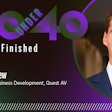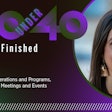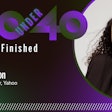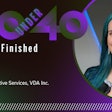Editor's Note: Timo Kiuru, an award-winning creative director and expert in entertainment and the experiential marketing industry, will write monthly columns for Connect. This is his first piece. Creativity is all about making change happen. I have experience from both creating events and being invited to speak to professional audiences throughout the world. That’s the reason why I want to list some things that have gone through my mind when I’ve been given a platform as a speaker.
1. A public speaker is a performer.
Just like a stand-up comedian, a musician or a magician, a public speaker is a performer. The idea of saying, “hello” to people you know from the audience and having a bit of small talk is very pleasant. The truth is, I would rather do it after I’ve given my speech. Every performer wants to collect his or her energy and thoughts for at least five minutes before showtime. My fellow speaker, Fredrik Hären, advises speakers to create a mood board that helps them get into the right mood. Why? Even the best speakers are insecure and battle self-doubt. Mood board helps speakers to get into the right mindset before stepping on stage. The reality is, the audience will catch the speaker’s vibe, verbal or non-verbal. I can’t emphasize how important this is. Emotions are contagious. Takeaway: It’s a good idea to make sure speakers have a private space where they can collect energy before getting into the limelight
2. No one likes to be sold and advertised to.
Public speaking is all about educating. Ultimately, you want the audience to learn something that will change their way of thinking. However, be aware. There are many public speakers out there whose aim is not to educate, but to sell. They are public sellers. Takeaway: Professional speakers have a speaking fee because they spend a tremendous amount of time preparing and putting together their speeches. Sure, you’ll find many who will speak for free, but often their goal is to sell the audience something. Who likes the feeling of being sold and advertised to? No one.
3. The title of the session matters.
I hadn’t really thought of this before listening to Stephen Gates’ podcast, “The Crazy One.” On one of the episodes Gates talks about the power of a great session name. Often, the first thing speakers are asked to do is to give the title and a short description of their session to the organizers of the event. Ideally, this should be the last thing speakers are asked to do. In order to come up with a unique presentation, one would need to have an idea of what the other speakers are planning to talk about. Many conferences have multiple tracks with different speakers. People often decide which presentation to attend based on the title of the session. First you create a product, and then you name it—not vice versa. Takeaway: Give the speakers a good amount of time to think about the title, description and takeaways of their session.
4. Sleep.
I created a Youtube video called “Five Tips on How to Organize Successful Events,” a few years ago. One important tip for event professionals is to sleep as much as possible the night before. If the hosts of the event are tired and low on energy before the event starts, then they would have wasted weeks or months of work. When the event begins, the hosts need to put on their best performance. This same applies to speakers, they need to be well rested when the show begins. I understand the importance of networking the night before the event. But it’s just not a winning combination if the speakers won’t be able to leave a cocktail party before 2:00 a.m., and the dress rehearsal starts at 6:00 a.m. the next morning. Takeaway: This sounds boring, but we speakers take our work seriously so let us get some sleep.
5. Understand the nature of public speaking.
I once had a call with a client for an upcoming speaking engagement. As always, I asked my client: “On a scale from 1 to 10—one being only hard facts and practical information and 10 being pure entertainment—where do you want my presentation to stand?” To my surprise she replied: “One, nothing but facts.” An excellent public speaker is a teacher, an entertainer and a change agent. It might be a good idea to select one of these first before you begin your career as a speaker. The true masters of the game are able to wear all three of these hats and switch between roles during a speech. Takeaway: Public speaking is about both function and form. Give the speakers an opportunity to entertain, educate, inspire and ignite change. Lastly. Event professionals worldwide, thank you for the amazing work you do. You make magic happen.
Timo Kiuru is a global creative director and the founder of a creative brand consultancy, The Unthinkable. He has written a free interactive book on experience marketing, and travels the world speaking to professional audiences. Kiuru was a member of the Connect Corporate 40 Under 40 in 2016.















